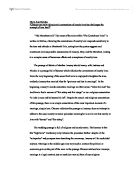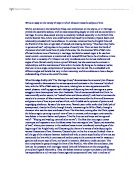Chaucer not only ridicules tale conventions of courtly love but challenges the concept of love itself" "The Merchants tale" like many of the tales within "The Canterbury Tales"
Mary-Ann Moloku
“Chaucer not only ridicules tale conventions of courtly love but challenges the concept of love itself”
“The Merchants tale” like many of the tales within “The Canterbury Tales” is written in Fabliau, ridiculing the conventions of courtly love responds sensitively to the tone and attitude in Merchant's Tale, noting how the poetry suggests and counteracts various possible assessments of January, May, and the Merchant, leading to a complex sense of humorous effects and conceptions of courtly love.
The passage of debate of whether January should marry, with Justinus and Placebo is a passage full of humour which ridicules the conventions of courtly love. From the very beginning of the scene field lexis is employed to heighten the tone, evidently January has married May for “gret ease and lust in marriage”. At the beginning, January’s words connotates marriage as either sexual “whan him lust” has lead him to find a woman of “fair schap and fair visage” or as a religious connotation “to lede in ease and holynesse his lyf”. Despite the sexual and religious connotations of this passage, there is no simple connotation of the most important element of a marriage, simply love. Chaucer ridicules this passage as January, does not attempt to adhere to the usual courtly romance procedure meaning he is not in love but merely in love with “beaute” and “fair schap”.







